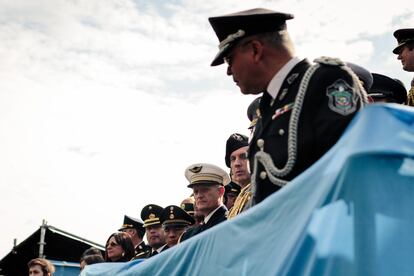Javier Milei sweeps away 22 army generals in largest military shake-up in 20 years
For analysts, the government is handing ‘a clear message of empowerment’ to the military, which now also occupies important positions in the Defense Ministry

Argentine president Javier Milei has shaken up the command structure of the country’s Armed Forces. The ultra right-wing politician assigned the Air Force to head the Joint Chiefs of Staff, the highest executive body of the military. In addition, he introduced changes in the leadership of the Argentine Army, Navy, and Air Force. The most drastic modifications were made within the army, where Milei appointed Alberto Presti as Chief of the General Staff and automatically retired 22 generals. For analysts, Milei’s government is handing “a clear message of empowerment” to the military, which now also occupies important positions in the Ministry of Defense.
The appointments announced Monday in the Official Gazette indicate that Brigadier-General Xavier Julián Isaac will be the new head of the Joint Chiefs of Staff; Rear Admiral Carlos María Allievi will take command of the Air Force; Brigadier-Major Fernando Luis Mengo, the Navy, and Brigadier-General Presti, the Army. With this last appointment, 22 senior generals will automatically retire: 23 if the resignation of the former Chief of the Joint Chiefs of Staff, Juan Martín Paleo, is added. That represents two thirds of the command corps, according to an estimate made by Clarín newspaper. It is the most drastic change in the army since the government of Néstor Kirchner (2003-2007), when the Peronist president forced 19 generals to retire.
Commanders who had links with the previous government, led by Peronist Alberto Fernández, have thus been removed from the army’s leadership structure. Fabián Calle, a political scientist specializing in defense issues, warns that the decision “has no ideological or political significance,” as he believes it did in Kirchner’s 2003 purge. “When one looks at the names, it is a homogeneous generalship; none of them is considered either left or right wing,” says Calle, who believes Presti was installed as army chief because he is a “young” military man with a “good image” within the forces. The political scientist believes the decision responds to a “profound renewal of the army” based on Milei’s defense and security agenda. “It is an important weapon in the government’s strategy for border control,” he adds.
Alignment with the United States
Analysts are waiting to see how the appointment of Isaac to head the Joint Chiefs of Staff from the air force will translate after a decade of army leadership of that command. “I venture that there will be a more linear view of subordination to the United States,” says Luciano Anzelini, a PhD in social sciences and professor at the Torcuato Di Tella University. This hypothesis is in line with the intentions of Milei, who during the electoral campaign stated that his government would align itself with Washington, Israel, and “the nations that respect freedom.” “We have to see how the Armed Forces are reconstituted from a strategic point of view,” says Anzelini, who was an official at the Ministry of Defense between 2019 and 2022 under the administration of Fernández.
The Joint Chiefs of Staff was consolidated as the highest military leadership body after the 1982 Falklands War between Argentina and the United Kingdom. At that time, it was considered the failure of the war was brought about by a lack of joint action between the three branches of the military and the Joint Chiefs became more relevant in terms of advising the Minister of Defense. Since Argentina’s return to democracy in 1983, the air force has been the head of the Joint Chiefs of Staff across three periods — between 1985 and 1989, in 1992, and between 2003 and 2013 — a total of almost 15 years. The army has held the position longest overall, some 21 years in total since the end of the last dictatorship, while the navy has only led the Joint Chiefs for around four years.
Historical claims
Members of the Armed Forces voted en masse for Milei in the elections of November 2023, when the ultra-right-winger, leader of La Libertad Avanza, obtained 56% of the ballot against the Peronist Economy Minister Sergio Massa. The new government will have to respond to some of the historical claims of the military, which for years has been demanding that their salaries be on a par with those of the security forces and that they be assigned a larger budget. During the Fernández administration (2018-2023), the National Defense Fund was created and a process of salary parity with the security forces was initiated, which is still ongoing. Within the Armed Forces, they expect these measures to have continuity under Milei.
During the electoral campaign Milei’s running mate, Victoria Villarruel, led the way on defense and security issues. The daughter, niece, and granddaughter of military men, she promised to increase the budget of the Armed Forces while Milei anticipated cuts in areas such as science, health, and education. In addition, Villarruel denied state terrorism during the last dictatorship in a speech that did not meet with the expected applause from the barracks, staffed today by new generations of military men. After the triumph of La Libertad Avanza, however, Villarruel was left by the wayside. The portfolios of Security and Defense went to Patricia Bullrich and Luis Petri, respectively, whose joint candidacy for the presidency was defeated in the first round of the elections; both subsequently threw their support behind Milei.
Calle points out that the salary and budgetary improvements that may be promoted from the Defense Ministry, however, will be conditioned by the Ministry of Economy, which will have to control inflation that is advancing at 1% per day, according to the government. “The military needs a stable economy, like any ordinary citizen,” says Calle. The political scientist adds that “there is also a lot to be done at a symbolic level. Monday’s appointments added to others in the Ministry of Defense, where retired military officers occupy important positions, such as the vice-minister, Claudio Ernesto Pasqualini. “They have never had such a presence in the Ministry of Defense since the return to democracy,” notes Calle.
The institution saw its funding reduced after the return to democracy and ceased to be a relevant actor in Argentine politics with the fall of the military dictatorship (1976-1983), which caused more than 30,000 people to disappear according to the estimates of human rights organizations. The Armed Forces had previously controlled Argentine politics for more than 50 years. In 1930, with the first coup d’état, they began a long series of attempts to repress the first mass political party in Latin America, the Radical Civic Union (UCR), and then, from 1955, Peronism. By the time they handed over power in 1983, they had forcibly removed five democratic governments from power. For many years, the military has been attempting to improve its public image.
Sign up for our weekly newsletter to get more English-language news coverage from EL PAÍS USA Edition









































